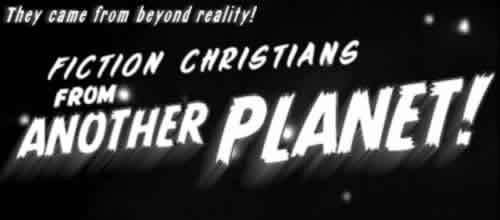Fiction Christians From Another Planet! V: Pagan Straw Men
Folk theology. Why over-honored? That’s the note I wrote after dialogue in a Christian contemporary/speculative novel I read last year. Now it occurs to me that “folk theology,” simplistic beliefs inherited by tradition and not Biblical study, is behind many alien beliefs common to fiction Christians from another planet(!).
Lame theology also leads to lame non-Christian characters. They don’t behave like real people of the human persuasion. As proof, witness this actual unedited exchange from an actual popular Christian author’s fantasy novel published, perhaps, in dimension 14-B:
Sir Terrance wanted to laugh. “You believe in the White Knight? Whom you’ve never seen?”
“Of course I do,” said Sir Rigelian. “And do you believe that a million gilded d’narr exist?”
“Yes …”
“Even though you’ve not seen them?” Sir Rigelian asked.
“That’s —” Sir Terrance sputtered. “That’s ridiculous. I still don’t believe in the Knight.”
“How do you know he doesn’t believe in you?”
Sir Terrance wanted to change the subject. “That’s impossible.”
“But here we are, going on the famed Quest for the Silver Sandals, against impossible odds.”
Though he had been a skeptic of the White Knight ever since the horrific death of his father, mother, cousins, and five siblings in that bathhouse fire that had left Sir Terrance alone and d’narrless, Sir Terrance had to admit that Sir Rigelian’s profound arguments, which he had never ever even once heard before during all his 47 sun-cycles in the kingdom, puzzled him.
— Original dialogue, based on that of a Christian contemporary/speculative novel
Three conclusions:
- Sir Terrance is an idiot.
- Sir Terrance is cousin to another group: a fiction non-Christian from another planet.
- Sir Terrance may have come off the set of a visually derivative, cashing-in-on-name-recognition-for-a-public-domain-story Wizard of Oz prequel: he’s made of straw.
 Like most straw men, this one is easy to dismantle. So I need not do that here. But if it’s this easy for Christian readers to recognize non-Christian caricatures — along with the corny Disney-Santa-Clause-movie-style “apologetics” used against them — how do you think actual nonbelievers think? Do they recognize people who resemble themselves? Will they like this kind of story? Do they feel respected even by Christian authors who show disagreement?
Like most straw men, this one is easy to dismantle. So I need not do that here. But if it’s this easy for Christian readers to recognize non-Christian caricatures — along with the corny Disney-Santa-Clause-movie-style “apologetics” used against them — how do you think actual nonbelievers think? Do they recognize people who resemble themselves? Will they like this kind of story? Do they feel respected even by Christian authors who show disagreement?
Yes, many non-Christians hate Christian novels for ridiculous reasons, claiming the novels are “preachy” (but secular media such as fornication-celebration songs, the New-Age-ish movie Avatar, and the president of the United States get a pass for preachiness), or because the novels “simulate” in story any beliefs pagans see as “intolerant” and thus can’t tolerate.
But here is a valid reason for pagans not to enjoy Christian novels: they see no characters whose depth, reasons for faith-rejection, or life stories in any way resembles their own.
That’s the problem. What potential diagnoses can we make?
1. Novelists mainly rely on authoritative “nonfiction” for data on nonbelievers.
 Thanks in part to popular materials from invading megachurchians about being “seeker-friendly” and things like that, many Christians simply haven’t been trained to be familiar with more than one type of pagan personality at a time. Instead we’re hyper-specialized. For instance, megachurchian manuals and George Barna statistics about the “un-churched” claim most of them are Hurt by Traditional Religion and simply need to be Cared For and to Have Their Felt Needs Met. But even in the less-fluffy sides of faith, Christians may “train” themselves only to deal with certain specific types of non-Christians: the atheist internet troll, the struggling single mom, the Mormon, the postmodern college student, or the Poor.
Thanks in part to popular materials from invading megachurchians about being “seeker-friendly” and things like that, many Christians simply haven’t been trained to be familiar with more than one type of pagan personality at a time. Instead we’re hyper-specialized. For instance, megachurchian manuals and George Barna statistics about the “un-churched” claim most of them are Hurt by Traditional Religion and simply need to be Cared For and to Have Their Felt Needs Met. But even in the less-fluffy sides of faith, Christians may “train” themselves only to deal with certain specific types of non-Christians: the atheist internet troll, the struggling single mom, the Mormon, the postmodern college student, or the Poor.
Often Christians are less adept at thinking on their feet and practicing Biblical wisdom in how they form relationships with non-Christians regardless of which “group” they inhabit.
2. Publishers limit popular novelists to those with Ministry Platforms.
 Recently Left Behind mastermind Jerry B. Jenkins woke up and realized that “traditional publishers have tightened their belts, and they keep demanding bigger platforms” — that is, as he earlier said, “a platform on the scale of a megachurch pastor.” (His solution is what one blogger found questionable: a new-author’s publication course for $10,000. Must credit Grace Bridges at Splashdown Books for this link.) Well, fancy that, Super J! But the fact that publishers’ requirements of Ministry Platforms limits newcomer authors is just one of the problems. Perhaps worse, by limiting authors to Ministry People, publishers make popular only novels by writers who’ve learned to see the world only in church-ministry categories.
Recently Left Behind mastermind Jerry B. Jenkins woke up and realized that “traditional publishers have tightened their belts, and they keep demanding bigger platforms” — that is, as he earlier said, “a platform on the scale of a megachurch pastor.” (His solution is what one blogger found questionable: a new-author’s publication course for $10,000. Must credit Grace Bridges at Splashdown Books for this link.) Well, fancy that, Super J! But the fact that publishers’ requirements of Ministry Platforms limits newcomer authors is just one of the problems. Perhaps worse, by limiting authors to Ministry People, publishers make popular only novels by writers who’ve learned to see the world only in church-ministry categories.
Thus readers find not Christ-loving storytellers writing from imagination fueled by Biblical truth and their own broader experiences, but what C. S. Lewis derisively termed “the bench of bishops getting together and trying to write plays and novels in their spare time.”
3. Having Christians admonish non-Christians with slogans such as “God believes in you even if you don’t believe in Him” seems ever so spiritual.
Here I’m afraid I must sound mean: if you have a Christian character repeat this slogan, I’m not sure you’re familiar with how human beings think and interact — or how God tends to argue for Himself and His truth in His own Story. It sounds spiritual. But it isn’t of the Spirit.
Spiritual solutions?
- Get to know actual pagans.
- Reject other-parts-of-the-body-denying (1 Cor. 12: 12-20) “platform” expectations.
- Be more “spiritual” according to God’s definitions, not ours.
Yet in some sense, authors and publishers only give Christian readers what they’ve “said” they want. How else may we as readers help change this?











































I’ve been cruising around Wattpad for the past few days, building a bit of readership for a story. I’ve done a lot of “story exchanges” (you read mine, I’ll read yours).
Real “pagans” are much more interesting than straw men. They’re people. They have problems and seek friendship and affirmation, same as Christians. The difference being that Christians have secret knowledge about how life really works.
Really, the longer I rub elbows with “pagans”, the less scary they are. It’s just people. I have no reason to offend them or even be offended by them. The Cross is offensive enough–I need to get out of its way and just be kind.
As for writing pagans, from what I’ve seen, most people aren’t “seekers”. They’re trying to struggle through life as best as they can, although there’s always some attraction for the supernatural, be it aliens, fairies, vampires, you name it.
Good points, Stephen. I don’t doubt, especially newbie writers with a message to tell, don’t tend to create plenty of unrealistic dialog. I know I did starting out, and it had nothing to do with theology. Just not thinking, “Would someone really say and do that right after someone died at their feet?”
But, yeah. Certain folk theologies and beliefs about non-Christians are as much straw men as some of the beliefs atheist and agnostics have of Christians. Getting past those to write about real people and real theology takes exposing one’s self to other people than your own “choir.”
Maybe by reviewing and discussing all stories the same, regardless of whether or not the story or its author are Christian. This means discussing the spiritual ramifications of all stories honestly, without giving Christian writers a free pass or always approving external spirituality. I think it also means trying to avoid Evangelical jargon when discussing and reviewing Christian stories.
I think there’s some wisdom here — though I admit because of my family allegiance, I will tend to give preferential treatment to Christian authors. However, because of family conflict, I’ll also be more frustrated when such authors don’t prove their faith by their artistic works, and thus imply to me that the Gospel is a lame Story worthy only of lame storytelling in response to this Story of the Author.
Agreed. In other words, we follow Scripture in holding brothers and sisters to higher standards, not lower ones — and not condeming them for failures, but encouraging them to transform their minds and hearts to be more like our Savior’s.
Again I believe I agree, though I’d love to see examples. I can only think of a few here: the previously mentioned I hear God’s voice daily emphases, or the sorts of jargon that is popularized by amateur “apologetics” or megachurch manuals — God believes in you even if you don’t believe in him, faith is believing without seeing, and so on. Or, to preview next week’s column, that ever-classic excerpt from the Book C. S. Lewis Didn’t Write: “You are not a soul. You are a soul. You have a body.”
Examples: The Four Spiritual Laws; the Rapture; to “witness to (someone)”; “dispensation of grace”; “…Personal Lord and Savior”; “(to have) quiet time”; “(Someone) lead (someone else) to the Lord”; “(someone) got saved”
In my Christian thought class last semester, the professor brought in one of his friends who is an atheist and let him explain his philosophy and we asked some questions. It’s the first time I’d ever had a conversation like that, and I like to think that our group was polite and professional about it. And in chapel today, our speaker mentioned how we need to view unbelievers as people first and foremost….
I think another reason behind the problem of using straw men in Christian fiction is a fear of not having the answer; that authors are only willing to write non-Christian characters whose objections they are capable of refuting. And this fails to reflect reality. I have a friend who chose to reject Christianity, and I have no easy or simple answers to his reasons for that decision, despite what Christian Fiction’s pagan straw men might lead me to believe. We put so much emphasis on knowledge and truth that we forget that sometimes God doesn’t give us easy answers and that sometimes we won’t be able to give a logical explanation that will satisfy their objections.
One of the (non-Christian) authors I respect most is Brandon Sanderson. In his novel The Way of Kings, he has an atheistic character. Despite being a Mormon, Sanderson gives this character all of atheism’s strongest arguments, to where at the end of the book (the first in a series), the atheist seems to be winning the debate she has been having with those around her.
This example intrigues me partly because it’s something I’ve never seen any Christian author dare to do – give the opposing side its strongest arguments, even arguments that they can’t necessarily give a trite answer to. Sanderson asked a question, and didn’t necessarily give a direct answer. I would love to see Christian authors willing to do the same: to accurately represent the very real difficulties and objections to believing in God that people have. We just have to be willing to not have a trite answer to every argument people have.
There does seem to be a pendulum in place, doesn’t there? Either Christians have to have all the answers (an unfortunate side-effect of the apologetics-centric subculture from which you and I both come) or they’re content to make do with anemic appeals to childlike, trusting, unshakable, and totally blind faith. On the one hand, it’s tempting to think that science can prove scripture — that nonbelievers can get bludgeoned into salvation by an all-out assault of the facts. On the other hand, it requires a kind of courage to face one of those facts in particular: that, regardless of “science,” “knowledge,” or the “onward march of progress,” faith remains unavoidable as the ultimate basis for any worldview. But both of these extreme reactions — furious research and argumentation, or a seemingly placid, zen-like state — tend, I think, to reveal more than a little personal insecurity.
If I feel that I must always have a comeback to every pagan salvo, if I sense my own vulnerability in each unanswered rhetorical strike, then it may be because I’m trying to compensate for something. Doubt, perhaps? And if I have yet to realize that no human argument can fully explain or justify the infinite Maker of everything seen and unseen, then I haven’t even caught the slightest whiff off a faded footprint from He Who follows no path but His own. Like, seriously: I have no conception of His all-consuming glory.
And if I feel that apologetics is all vanity, a chasing after the wind, and that there’s no cure for people who won’t come the Father like little children, then I need to sit awhile at the feet of the God Who teaches His gospel in the synagogues and displays pierced hands and feet to those of His own handpicked cadre who disbelieve. The Author of reason didn’t give us brains so we could learn to shut them off. And if I find it a wearying or frightening prospect to make a defense to anyone who asks me for a reason for the hope that is in me, then perhaps I don’t really have a reason to hope after all. Perhaps I’m putting my blind faith in blind luck.
As Christians, our insecurities can exhibit themselves in wildly divergent ways. How then should we confront opposing worldviews? As always, we must look to Christ our Example. He pulled no punches when lambasting the stagnant legalism of the pharisaical establishment, spared no tender compassion when sharing His table with sincere seekers and repentant sinners, and didn’t raise an eyebrow (okay, I can’t know that) when abandoned by those unwilling to swallow non-seeker-friendly truths. But no matter who He’s talking with, one thing remains constant: Christ never gets desperate. He knows His audience inside and out — what they need to hear, how they need to hear it — but He never gets pushy. He speaks with authority, yet leads them on with parables. He asks them lots of questions, yet His answers are few and far between. His isn’t the brash forcefulness or the ignorant insistence of the perennially insecure, but the calm, precise strength of preternatural confidence. His approach had the latitude to change with each new person He met, because He was sharing His life with other people instead of attempting to plug them into a formula.
And when those people spurned Him? Well, His approach there is no less flexible. Some He slapped upside the head with the truth (John 8:31-59), while to others He said nothing at all (Matt. 27:11-14). Regardless, my point is this: He isn’t afraid of failure. Not that He knew He would always succeed; on the contrary, Christ was and is well-acquainted with rejection. But He doesn’t let that rejection stop Him. He engages each and every time, in spite of the risk. He doesn’t feel the need for a Magic Silver Bullet of Inarguable Apologetics, and He doesn’t drop inane, slippery-when-swallowed quips like, “I believe in you even if you don’t believe in Me.” He speaks the truth in love, then gives me space to believe it, or not.
God’s confidence in His own identity is inexhaustible. It’s one of the reasons I love Him so.
Whoa, we have a rare thumbs-down for Austin’s comment. Just so you know: it wasn’t me. (Not that there’s anything wrong with disapproving.) I’d love to hear from our mysterious critic, perhaps hooded and skulking ninja-like in the shadows.
Love how you phrased this. Yes. He is the most confident Person in the universe.
That may be a subtle motive for only including “non-Christian” characters who have easy-to-refute reasons against faith. Last week’s episode tried to touch on this about why megachurchian sentiments infect so many stories, over against reality:
Austin refers to this also when he mentions author insecurities. That’s another simple explanation for why we get so many insecure non-believers — or even Christians — as novel characters. It’s simple projection. And unfortunately, many Christians (particularly those trained to believe that people only reject Christ and faith in Him because they simply don’t know the information) naturally project their own insecurities on non-Christians. This isn’t respectful to them, or loving to other Christians, who then have a mythology endorsed in books, a mythology that in effect says, “pagans aren’s so scary; you’ll never meet a really hard case.” But:
Hard cases do exist. Especially those folks who say things like, “I used to be a Christian, and now I’m not.” Well, we might say, they weren’t really a Christian, they were a false convert, they didn’t take it seriously, they didn’t, they didn’t. …
But then comes the situation where (this is an actual case) the supposedly un-serious Christian took things far more seriously than I ever did, and in fact was even in Professional Ministry, and wrote purity-advocating columns for a Christian singles’ webzine, and married someone else that way. Then years later both of them completely turned on the faith, got divorced, and insisted later in secular interviews that it was the Old Testament “genocide” passages that did in their faith. (I for one find it ridiculous to believe they really grew up never wrestling with or even hearing these passages. But that’s a brief digression.)
Why don’t we get more of these kinds of scenarios in fiction? Because they might make the villains to scary, or even the “secular ally” characters too scary. Because they might reflect reality better. Because they might lead to awesome stories.
Hey, wait a minute. It seems all those “negative” reasons are actually positive!
I think some of the poor writing of non-Christian characters might come from a right attitude and a truthful position–we want non-Christians to come to Christ, to believe in Him, to experience the joy found only in Him; and we know that the Bible has the answers to their lost condition. As a result, we may not listen to them well. We rush to give answers to questions they aren’t asking and miss the ones they actually need to know before they can draw near to God.
With all due respect to Mr. Jenkins, I don’t think platform is a major factor yet in publishers putting out fiction. I won’t say no factor. Clearly if someone like Chuck Swindoll decided to write a novel, he’d have a decided advantage over most newbie novelists. But I know too many first time novelists with traditional publishers who don’t have speaking gigs and aren’t already well-known, to believe platform is a big reason a lot of writers aren’t finding a publisher.
The hard thing about reviewing Christian speculative fiction in an honest way which would warn buyers away from a book (which is what communicates to publishers) is that the message doesn’t come through as, Bad Christian novels are not ones we want, but instead as , Christian speculative novels are not ones we want. It poses a dilemma for the reviewer.
Becky
I don’t know if not knowing pagans is possible. I mean, everyone knows pagans if just by working with them. Unless the author went from Christian family to Christian college to Christian ministry position in total segregation from the world. If anything I worry myself that I really don’t understand fellow Christians as much as I should, rather than pagans.
I think maybe it might be the need for fantasy to be conversion stories more than being sheltered from them. Maybe Christians writing about Christians could be better than trying to always shoehorn a plan of salvation in every book.
[…] surely want to be a church member, in favor of following yet another (likely megachurch-clichéd or straw-man) nonbeliever. This gets […]